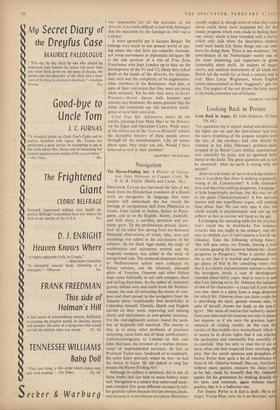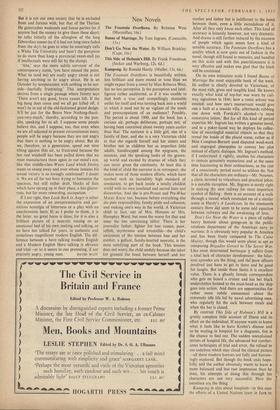Looking Back in Protest
THE operation slip is signed, sealed and delivered the lights are on and the instruments laid out the heavy breathing of the surgeon mingles with the hiss, of the steriliser; and who should be wheeled in but John Osborne's problem-child stripped of its Royal Court clothes, anxsthetisetl into inactivity by print, and its agonised belly bared to the knife. The great question can at last be answered: what on earth is wrong with the patient?
After several hours of nerve-wracking explora- tion it is evident that there is nothing organically wrong at all. Construction? A trifle distended here and there but nothing dangerous. Language? A little hypertrophy perhaps, but this may be all to the good. Characterisations? A few nervous spasms and one superfluous organ, still nothing fatal about that. We can only take it that the whole trouble is psychosomatic and sew up the sufferer as fast as anyone will hand us the gut.
Exchanging the operating table for the psychia- trist's couch has its drawbacks. For instance, remarks that one might in the ordinary way dis- miss as childish jeux d'esprit assume a horrid sig- nificance. Take the following striking fancy : 'She will pass away, my friends, leaving a trail of worms gasping for laxatives behind her—from purgatives to Purgatory.' What is sinister about this is not that it is morbid and unpleasant—we get plenty of that in the consulting room—but that it is a clumsy and passionate attempt to shock the bourgeois, surely a case of development retarded about thirty years. And in case it is said that I am foisting on to Mr. Osborne the opinions of one of his characters—a crazy kid if ever there was one—here is a piece from a stage,direction for which Mr. Osborne alone can claim credit (he is describing the hard, genteel woman who, in spite of herself, throws her body to the non-U hero): 'Her sense of matriarchal authority makes most men who meet her anxious not only to please but impress, as if she were the gracious repre- sentative of visiting royalty. In this case the royalty of that middle-class womanhood, which is so secure in its divine rights that it can tolerat the parliament and reasonably free assembly o its menfolk.' One has only to read this to see at once, what one had suspected from watching the play, that the social opinions and prejudices of Jimmy Porter bear quite a lot of resemblance to those of Mr. Osborne himself. One can, therefore, without many qualms, measure the claim (not, to be fair, Made by himself) that Mr. Osborn speaks for his generation by looking directly at■ his hero, and conclude, again, without man) qualms, that it is a ludicrous one.
For Jimmy Porter is in fact a dodo. He is an Angry Young Man, sure; he is an Outsider, sure. But it is not our own society that he is excluded from and furious with, but that of the Thirties. He gatecrashes weekends and house parties (as if anyone had the money to give them these days); he talks bitterly of the afterglow of the long Edwardian sunset (as if it had not long since faded from the sky); he goes to what he sneeringly calls a White Tile University and hasn't the gumption to do more than keep a provincial sweet-stall (as if intellectuals were still hit by the slump).
`Aha,' says the more subtle surveyor of the contemporary scene, 'you have missed the point. What he (and we) are really angry about is not having anything to be angry about. He is an Outsider by temperament with nothing to be out- side—fearfully frustrating.' This interpretation derives from a single passage where Jimmy says `There aren't any good, brave causes left. if the big bang does come and we all get killed off, it won't be in aid of the old-fashioned grand design. It'll be just for the Brave New Nothing-thank- you-very-much,' thereby, according to the pun- dits, speaking for us all. I suppose some people believe this, and I suppose, too, that even when we are all adjusted to present circumstances many people will be angry because they are not angry that there is nothing to be angry about. But do we, therefore, as a generation, spend our time tilting against thin air, so frustrated because the last real windmill has been pulled down that we must manufacture them again in our mind's eye, like that middle-class Waste Land which Jimmy wants to sweep away and over whose inmates his sexual victory is so lovingly celebrated? I doubt it. We are all far too busy trying to humanise the spacious, but still rather drab, blocks of flats which have sprung up in their place, a less glamo- rous, but far more rewarding, occupation.
If I am right, then Look Back in Anger is either the expression of an unrepresentative and per- nicious nostalgia of bitterness or a play with an anachronistic hero. If, as I prefer to think, it is the latter, no great harm is done, for it is also a brilliant picture of a neurotic tossing on an emotional bed of his own making and talking, as no hero has talked for years, in authentic and sometimes magnificent modern English. The dif- ference between a hero talking modern English and a Modern English Hero talking is obvious and vital —or so it seems to one protesting, if not precisely angry, young man. DAVID WATT



































 Previous page
Previous page